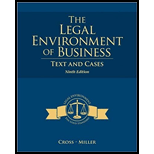
Concept explainers
Case summary: The company KCCC operates coal mines in West Virginia. The US Department of Labor charged the no.1 coal mine of KCCC for “significant and substantial” (S&S) violations of the FMSH Act. There was a potential danger of explosion due to improper sealing of electronic equipment. The violation of the mine act designates that it ‘could significantly and substantially affect and cause safety and health threats. The argument of secretary that ‘Could’ constitutes the mere possibility of threat is hazardous if the violation existed. The company, KCCC filed a lawsuit against the secretary of the Department of Labor to evident the violation.
To find: The deference in the interpretation of the statute by the court.
Trending nowThis is a popular solution!

Chapter 23 Solutions
The Legal Environment of Business: Text and Cases
- Can you solve this general accounting problem using appropriate accounting principles?arrow_forwardsolve this question by using appropriate methodology and true answer.arrow_forwardProblem 2: At a raffle, 2000 tickets are sold at $5 each for five prizes of $2000, $1000, $500, $250, and $100. You buy one ticket. What is the expected value of your gain? 1. Find the gain for each prize. 2. Write a probability distribution for the possible gains. 3. Find the expected value. 4. Interpret the results.arrow_forward
- QUESTIONS 3: Discuss how socio-economic conditions of South Africa influence marketing decisions for Herbskin Naturals. Provide examples of how these conditions might affect pricing an product availability strategiesarrow_forwardCan you help me solve this general accounting question using the correct accounting procedures?arrow_forwardNonearrow_forward
 BUSN 11 Introduction to Business Student EditionBusinessISBN:9781337407137Author:KellyPublisher:Cengage Learning
BUSN 11 Introduction to Business Student EditionBusinessISBN:9781337407137Author:KellyPublisher:Cengage Learning Essentials of Business Communication (MindTap Cou...BusinessISBN:9781337386494Author:Mary Ellen Guffey, Dana LoewyPublisher:Cengage Learning
Essentials of Business Communication (MindTap Cou...BusinessISBN:9781337386494Author:Mary Ellen Guffey, Dana LoewyPublisher:Cengage Learning Accounting Information Systems (14th Edition)BusinessISBN:9780134474021Author:Marshall B. Romney, Paul J. SteinbartPublisher:PEARSON
Accounting Information Systems (14th Edition)BusinessISBN:9780134474021Author:Marshall B. Romney, Paul J. SteinbartPublisher:PEARSON
 International Business: Competing in the Global M...BusinessISBN:9781259929441Author:Charles W. L. Hill Dr, G. Tomas M. HultPublisher:McGraw-Hill Education
International Business: Competing in the Global M...BusinessISBN:9781259929441Author:Charles W. L. Hill Dr, G. Tomas M. HultPublisher:McGraw-Hill Education





